NAMED LECTURES
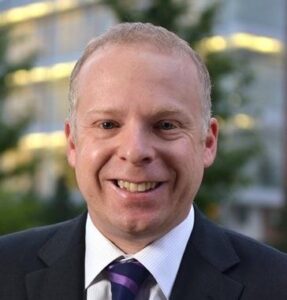
BERNARD C. GETTES, MD LECTURE
Richard S. Davidson, MD
Dr. Richard S. Davidson joined the University of Colorado Eye Center in 2002 as a specialist in cataract, corneal and refractive surgery. He is a Professor of Ophthalmology and holds the Endowed Chair in Eye Care Innovation at the University of Colorado School of Medicine. In addition, he serves as the Vice Chair for Quality and Clinical Affairs in the Department of Ophthalmology, University of Colorado Sue Anschutz-Rodgers Eye Center, University of Colorado School of Medicine. Dr. Davidson is also the Team Ophthalmologist for the Colorado Avalanche and Denver Nuggets Professional Sports Teams and serves as co-medical director of the Rocky Mountain Lions Eye Bank.
Dr. Davidson attended Hahnemann University School of Medicine, in Philadelphia, Pa., from which he graduated in 1997. While there, he was elected into Alpha Omega Alpha, the national medical honor society. He then completed his residency at the world-renown Wills Eye Hospital in Philadelphia, where he was elected by his peers and supervisors to serve as Chief Resident his final year.
In 2002, Dr. Davidson completed his fellowship in cornea, external disease and refractive surgery with Drs. Mark Mannis and Ivan Schwab at the University of California, Davis.
Since joining the University of Colorado Eye Center, Dr. Davidson has presented his research and has given instructional courses at conferences nationally and internationally and authored numerous book chapters and other publications on his specialty. He is actively involved in ongoing clinical research, collaborates in national FDA trials, and is regularly asked by the Colorado media to comment on ophthalmology-related issues.
Among his many achievements, Dr. Davidson has been awarded the 1st Annual Academic Faculty Teaching Award from the University of Colorado Department of Ophthalmology in 2006, the Senior Achievement Award of the American Academy of Ophthalmology, and the University of Colorado Hospital President’s Award. In addition, he was listed as a “Top Doctor” in the 2012 issue of U.S. News and World Report and the 2012, 2014, 2015, 2016, 2017, 2018 and 2023 issues of Denver lifestyle magazine, 5280.
His expertise includes small incision, no-stitch cataract surgery (including LenSx laser-based cataract surgery), corneal transplantation (including “ultra-thin” DSAEK and DMEK) and refractive procedures such as LASIK and PRK.
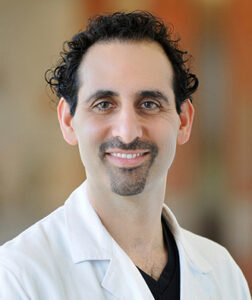
E. HOWARD BEDROSSIAN, MD LECTURE
Rod Foroozan, MD
Dr. Rod Foroozan is a neuro-ophthalmologist at the Baylor College of Medicine, Department of Ophthalmology in Houston, Texas. He graduated from Albert Einstein College of Medicine in New York City and completed his residency and fellowship at Wills Eye Hospital in Philadelphia. He has written and lectured on a number of topics in neuro-ophthalmology and is the editor of the International Ophthalmology Clinics journal.
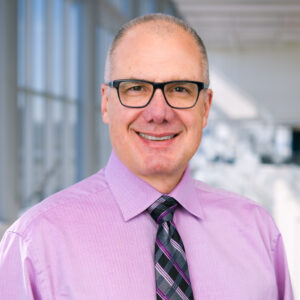
ARTHUR J. BEDELL, MD LECTURE
J. William Harbour, MD
Dr. J. William Harbour is a pioneering retina specialist, ocular oncologist and cancer researcher whose discoveries have transformed the management of patients with uveal melanoma and other eye cancers. He attended Johns Hopkins for medical school, Wills Eye Hospital for residency, Bascom Palmer Eye Institute for retina fellowship, University of California San Francisco for ocular oncology fellowship, and Washington University in St. Louis for post-doctoral cancer research training.
Dr. Harbour was on the faculty of Washington University for 16 years, rising to the rank of Distinguished Professor before being recruited to the University of Miami in 2012 to become the Mark J. Daily Endowed Professor and Vice Chairman for Translational Research at Bascom Palmer Eye Institute, and Associate Director for Basic Science at Sylvester Comprehensive Cancer Center. In 2021, Dr. Harbour was recruited to the University of Texas Southwestern Medical Center to become the Chair of the Department of Ophthalmology, where he continues his clinical practice, educational activities, and research program.
His research has been continuously funded for over 20 years by the National Institutes of Health, Research to Prevent Blindness, Alcon Research Institute, and other numerous other sources. Among his many transformative contributions, Dr. Harbour invented a multi-gene prognostic test for uveal melanoma that has become the standard of care in North America. He discovered that mutations in BAP1 are the most important cause of metastasis in uveal melanoma, and that SF3B1 mutations are associated with intermediate metastatic risk in this cancer. More recently, he identified therapeutic targets and immune checkpoint molecules that have led to new clinical trials for metastatic uveal melanoma.
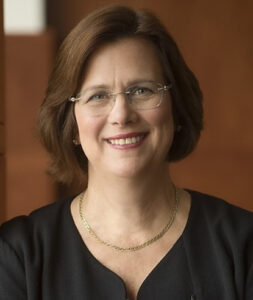
RICHARD A. ELLIS, MD LECTURE
Joan W. Miller, MD
Dr. Joan W. Miller is the David Glendenning Cogan Professor of Ophthalmology and Chair of the Department of Ophthalmology at Harvard Medical School (HMS), as well as Chair of Ophthalmology at Massachusetts Eye and Ear and Massachusetts General Hospital, and Ophthalmologist-in-Chief at Brigham and Women’s Hospital. A graduate of Massachusetts Institute of Technology, Dr. Miller earned her medical degree from HMS and completed her ophthalmology residency and vitreoretinal fellowship at Massachusetts Eye and Ear. In 2002, Dr. Miller became the first female physician to achieve the rank of Professor of Ophthalmology at Harvard Medical School; and in 2003, the first woman to serve as Chair of the Department of Ophthalmology. She is also the first woman appointed as Chair of Ophthalmology at both Mass Eye and Ear and Massachusetts General Hospital.
An internationally recognized expert on retinal disorders, Dr. Miller and her colleagues at Massachusetts Eye and Ear/HMS pioneered the development of verteporfin photodynamic therapy (Visudyne®), the first pharmacological therapy for age-related macular degeneration (AMD). The group also identified the key role of vascular endothelial growth factor (VEGF) in ocular neovascularization, leading to the development of anti-VEGF therapies now administered to millions of people with sight-threatening retinal diseases annually around the world. Dr. Miller’s current studies focus on the pathogenesis of AMD, including genomics, metabolomics, imaging, and functional measures; strategies for early intervention in AMD; and neuroprotective therapies for retinal diseases.
Her scholarly contributions include over 390 original research investigations, reviews, book chapters, and editorials. Dr. Miller serves on the editorial board for the journals Ophthalmology and Ophthalmology Retina, and has served as an editor of several textbooks, including the recently published 4th edition of Albert and Jakobiec’s Principles and Practice of Ophthalmology (Springer). Dr. Miller is a member of the National Academy of Medicine, the Academia Ophthalmologica Internationalis, and the Dowling Society, as well as a Gold Fellow of Association for Research in Vision and Ophthalmology (ARVO). Among her numerous honors, Dr. Miller delivered the 2012 Edward Jackson Lecture for the American Academy of Ophthalmology (AAO) and was a co-recipient of the 2014 António Champalimaud Vision Award, the highest distinction in ophthalmology and visual science. In 2015, Dr. Miller became the first woman to receive the Mildred Weisenfeld Award for Excellence in Ophthalmology from ARVO; in 2018, she became the first woman awarded the Charles L. Schepens Award from AAO. Dr. Miller was also awarded the 2018 Lucien Howe Medal from the American Ophthalmological Society, and the 2018 Gertrude D. Pyron Award from American Society of Retinal Surgeons.
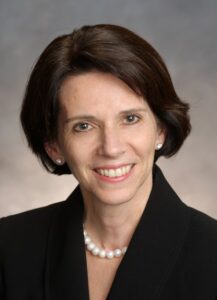
IRVING H. LEOPOLD, MD LECTURE
Janey L. Wiggs, MD, PhD
Dr. Janey L. Wiggs is the Paul Austin Chandler Professor of Ophthalmology and Vice Chair for Clinical Research in Ophthalmology at Harvard Medical School and the Massachusetts Eye and Ear. She also directs the CLIA-certified genetic testing laboratory at Mass Eye and Ear and is a co-director of the Ocular Genomics Institute. Dr. Wiggs is a physician scientist and sees patients in the Glaucoma Service at Mass Eye and Ear.
Dr. Wiggs received her BA and PhD degrees in biochemistry from the University of California at Berkeley and her M.D. degree from Harvard Medical School. She did post-doctoral training in molecular genetics under the direction of Dr. Ted Dryja. Dr. Wiggs completed the ophthalmology residency at Massachusetts Eye and Ear and received fellowship training in glaucoma and also in medical genetics and is one of only a few ophthalmologists certified by the both the American Board of Ophthalmology and the American Board of Medical Genetics. Dr. Wiggs’ research program is focused on the discovery and characterization of genetic factors that contribute to the blinding eye disease glaucoma and has been continuously funded by the National Eye Institute (NEI) for over 30 years. She has also received research awards from other sources including the March of Dimes Foundation. She is investigating the genetic etiologies of both early-onset and adult forms of glaucoma and is the PI of the NEIGHBORHOOD consortium for gene discovery in primary open angle glaucoma and a founding member of the International Glaucoma Genetics Consortium (IGGC). She has also participated in research programs funded by the US-INDO joint working group (NEI) and the NEI eyeGENE consortium and is currently a co-chair of the ClinGen Ocular Domain funded by NHGRI.
Dr. Wiggs was the inaugural chair of the Genetics Group for ARVO and is an ARVO gold fellow. She currently serves on the editorial boards of IOVS, JAMA Ophthalmology, Molecular Vision, Journal of Glaucoma, and Annual Reviews in Vision Science. She is a member of the scientific advisory boards for the Glaucoma Research Foundation, the Glaucoma Foundation and Research to Prevent Blindness and is a past member of the National Advisory Council of the National Eye Institute. She has received the Heed Award, the Heed/Knapp Award, the Research to Prevent Blindness Scholar Award, the AAO Honor Award, the Lew Wasserman Merit Award, the Alcon Research Award, the David L. Epstein award, the Mildred Weisenfeld award and was a winner of the NEI Audacious Goal competition. She has delivered numerous named lectures including the Clinician-Scientist Award lecture (American Glaucoma Society) and the Shaffer Lecture (American Academy of Ophthalmology). She is a member of the Glaucoma Research Society, the American Ophthalmological Society, the Academia Ophthalmologica Internationalis and an elected member of the National Academy of Medicine.

